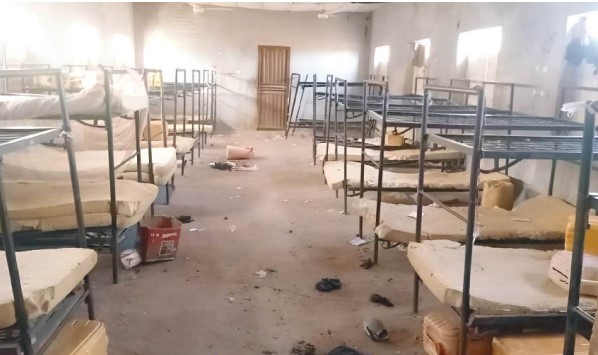ABUJA — In a glimmer of hope amid escalating insecurity in Nigeria’s northwest, authorities confirmed on Tuesday that one of 25 schoolgirls abducted from a boarding school in Kebbi State has escaped and reunited with her family, as military and local hunters ramp up a high-stakes rescue operation for the remaining captives.
The predawn assault unfolded early Monday at the Government Girls Comprehensive Secondary School in Maga town, where gunmen on motorcycles stormed the premises, firing indiscriminately and abducting the students before fleeing into the surrounding bushland. The raid, which also claimed the life of the school’s vice principal, Hassan Yakubu Makuku, has reignited fears over the resurgence of school-targeted kidnappings in the region.
School principal Musa Rabi Magaji verified the escape, noting that the girl made her way home late Monday evening after evading her captors. A second student fled the scene during the initial chaos and was unharmed. “They are safe and sound,” Magaji told reporters, his voice laced with cautious relief.
Verified footage circulating online, authenticated by independent sources, depicts the two girls—appearing to be around 12 or 13 years old—huddled with relatives in their village, their faces etched with trauma but spirits unbroken. The images underscore the human toll of an attack that has left families in Maga reeling from shock and sorrow.
Swift Military Mobilization
The incident triggered an immediate, multifaceted response from federal and state security apparatus. Chief of Army Staff Lt. Gen. Waidi Shaibu issued a terse directive to troops under Operation FANSAN YANMA, Nigeria’s counter-banditry initiative, ordering “intelligence-driven operations and relentless day-and-night pursuit of the abductors.” “We must find these children. Act decisively and professionally on all intelligence. Success is not optional,” Shaibu emphasized in a statement that brooked no failure.
Kebbi Governor Nasir Idris, who rushed to the school shortly after the attack, vowed an all-out effort to secure the girls’ release. “We will leave no stone unturned,” he pledged during an on-site briefing, flanked by tearful parents and community leaders. Local hunters, renowned for their bush-tracking prowess, have joined forces with the military, combing forested enclaves where the gunmen are believed to be holding the students.
By Tuesday evening, President Bola Tinubu escalated the federal response, dispatching Vice President Kashim Shettima to Kebbi for direct engagement with the affected families. Shettima, addressing a gathering in Birnin Kebbi, relayed Tinubu’s assurances of “unwavering commitment” to the girls’ safe return, framing the crisis as a national imperative. “The full weight of our security machinery is mobilized. These daughters of Nigeria will be home soon,” he affirmed, urging calm amid the palpable anguish.
A Community’s Raw Reckoning
Eyewitness accounts from Maga paint a harrowing picture of the assault’s ferocity. Resident Abdulkarim Abdullahi, roused from sleep by the staccato bursts of gunfire, recounted: “I was at home when I suddenly heard gunshots from the school. We were told that the attackers entered with many motorcycles.” The assailants, masked and methodical, targeted the girls’ dormitory, herding them onto bikes in a matter of minutes.
The slaying of Makuku added a layer of profound personal devastation. His widow, Amina Hassan, shared a chilling detail with journalists: “Three of them entered and asked my husband, ‘Are you Malam Hassan?’ and he responded, ‘Yes, I am.’ They told him that we are here to kill you.” Makuku, a veteran educator gunned down in his office, leaves behind a family shattered by loss and a school community forever altered.
As of Tuesday night, efforts to contact the Kebbi State Police Command for an operational update were ongoing, with sources indicating heightened patrols and aerial surveillance in the area. While NEWSFOCUS could not independently corroborate all details at press time, the confirmed escape offers a fragile beacon in an otherwise grim narrative.
Echoes of a Persistent Menace
This latest outrage slots into a grim continuum of banditry plaguing northern Nigeria, where armed groups—often ex-herders turned marauders—routinely ambush schools, highways, and rural outposts in a bid for ransom, recruits, or retribution. Since 2014, over 1,600 students have been seized in similar raids, from Chibok’s enduring tragedy to more recent abductions in Kaduna and Zamfara. The Kebbi incident, coming barely weeks after a spate of farmer-herder clashes, exposes the fraying social fabric and strained resources of a region where insecurity has displaced thousands and stalled development.
Critics, including local civil society voices, have decried the recurring pattern as a failure of proactive intelligence and community policing, calling for bolstered border controls along porous frontiers with Niger and Benin. As the sun sets on another day of uncertainty for the 24 missing girls, their fate hangs in the balance— a stark reminder that in Nigeria’s heartland, the line between schoolyard and warzone remains perilously thin. Security teams vow breakthroughs soon, but for the families of Maga, hope is measured in hours, not headlines.

